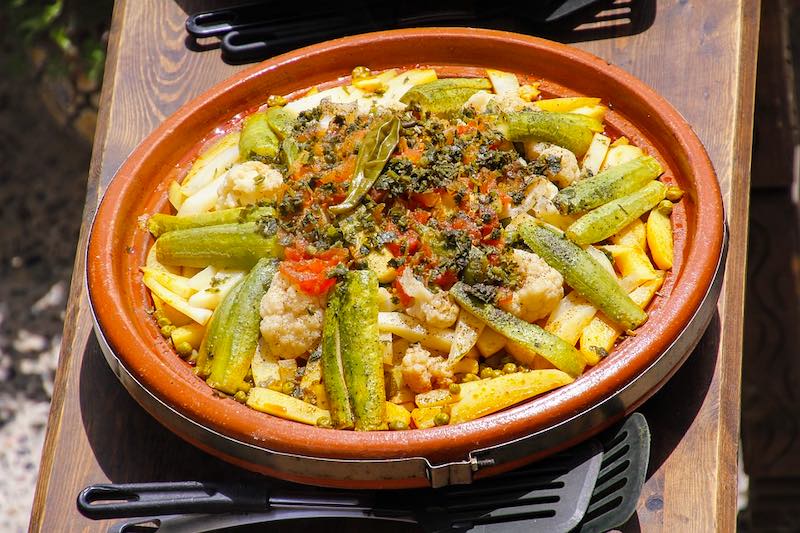Flavorful Moroccan Food Las Vegas Spots You’ll Love
Flavorful Moroccan Food Las Vegas Spots You’ll Love
Blog Article
Check Out the Flavors of Mediterranean Food: A Journey Via Health And Wellness and Preference
The Mediterranean diet, commemorated not just for its abundant tapestry of tastes yet additionally for its countless health and wellness advantages, welcomes a closer examination of its beginnings and vital ingredients. With a structure improved fresh vegetables, whole grains, and healthy and balanced fats, this cuisine exhibits an unified balance between taste and nutrition. As we check out popular meals and their dietary benefits, one must think about how these elements add to general wellness. What makes this culinary tradition attract attention to name a few nutritional patterns? The response exists in its distinctive approach to food and wellness.
Beginnings of Mediterranean Food
Commonly regarded as one of one of the most lively and varied cooking traditions, Mediterranean cuisine has its beginnings deeply rooted in the historical and geographical context of the region. Including the cooking methods of nations bordering the Mediterranean Sea, such as Italy, Greece, Spain, and Turkey, this cuisine has developed over centuries, affected by a confluence of cultures, profession, and environment.
The old people of the Mediterranean, including the Greeks, Romans, and Phoenicians, played a critical duty fit these cooking practices. The exchange of ingredients and techniques amongst these societies fostered an abundant tapestry of tastes and cooking techniques. Geography also dramatically influenced the diet regimen; for instance, seaside areas leaned greatly on fish and shellfish, while inland regions highlighted making use of grains, vegetables, and livestock.
Furthermore, the region's environment, characterized by warm, dry summers and moderate, wet winters months, assisted in the cultivation of a vast selection of vegetables, herbs, and fruits. This agricultural bounty added to a food that commemorates freshness and seasonality. Therefore, Mediterranean cuisine stays not only a reflection of its background yet also a testament to the withstanding link between food, society, and the environment.
Trick Components and Their Benefits
The rich background of Mediterranean food is mirrored in its key ingredients, which are fundamental to producing the region's unique tastes. Olive oil, a cornerstone of this culinary practice, supplies countless health and wellness advantages, consisting of heart wellness promo and anti-inflammatory buildings. Rich in monounsaturated fats, it serves as a much healthier alternative to hydrogenated fats.
Fresh vegetables such as tomatoes, cucumbers, and bell peppers are commemorated for their vibrant flavors and dietary value. They are loaded with minerals, anti-oxidants, and vitamins, adding to total health and well-being. Legumes, consisting of chickpeas and lentils, supply a robust resource of healthy protein and fiber, making them essential for a well balanced diet plan.

Popular Mediterranean Cuisines
Delightful diversity identifies prominent Mediterranean meals, each offering an unique mix of flavors and social impacts (mediterranean food in las vegas). The region's cooking landscape is abundant with staples such as hummus, a luscious mix of chickpeas, tahini, and garlic, often acted as a dip with pita bread. An additional standard is the Greek moussaka, a layered casserole of eggplant, ground meat, and béchamel sauce, showcasing the harmony of textures and preferences

Fish and shellfish additionally plays a popular role, as seen in dishes like paella from Spain, which combines rice, saffron, and a range of fish and shellfish, reflecting seaside impacts. For those with a wonderful tooth, baklava, a bread made from layers of filo dough, nuts, and honey, provides an indulgent and rich experience.
These recipes not just exhibit the cooking artistry of the Mediterranean however also function as a testimony to the area's abundant background and cultural exchanges.
Health Advantages of Mediterranean Diet
Countless studies have highlighted the health and wellness benefits related to the Mediterranean diet, which is identified by a high consumption of fruits, veggies, whole grains, and healthy and balanced fats, specifically olive oil. This dietary pattern has actually been linked to a decreased risk of chronic conditions, consisting of heart problem, diabetes mellitus, and particular kinds of cancer. The emphasis on plant-based foods offers important nutrients and anti-oxidants, which add to general health and well-being.
Research study has actually demonstrated that adherence to the Mediterranean diet plan can boost cardiovascular wellness by decreasing blood stress and cholesterol levels. Additionally, the diet's anti-inflammatory properties might assist in managing weight and reducing the risk of obesity-related problems. The inclusion of fatty fish, rich in omega-3 fatty acids, sustains brain health and wellness and cognitive function.
Additionally, the Mediterranean diet regimen advertises a balanced strategy to consuming, motivating mindful consumption and social communications throughout meals, which can improve mental wellness and total top quality of life. Its diverse tastes and nutrient-dense active ingredients make it a satisfying and sustainable dietary choice, promoting lasting adherence and various health and wellness benefits (mediterranean food in las vegas). Welcoming this diet plan may bring about a much more dynamic, healthier lifestyle

Tips for Incorporating Mediterranean Flavors
Integrating Mediterranean tastes into your meals can transform your dining experience while enjoying the diet's health advantages. To begin, make resource use of a range of fresh herbs and spices, such as oregano, rosemary, and basil, to raise the preference of your meals. These aromatic additions not only improve flavor but also boost nutritional worth.
Next, concentrate on including standard components like olive oil, tomatoes, garlic, and lemon. Usage extra virgin olive oil as your primary food preparation fat, showering it over salads or using advice it for sautéing veggies. In addition, tomatoes can be appreciated in various kinds, from fresh salads to roasted meals, offering necessary vitamins and anti-oxidants.
Entire grains, such as quinoa, farro, and bulgur, are additionally crucial elements of the Mediterranean diet regimen. Alternative improved grains with these nutrient-dense options to provide fiber and a satisfying structure. Furthermore, do not forget to include a variety of beans, such as lentils and chickpeas, which function as exceptional sources of plant-based protein.
Conclusion
The exploration of Mediterranean cuisine exposes an abundant tapestry of flavors and dietary benefits that add to total health and wellness. By highlighting fresh ingredients, such as olive oil, vegetables, and beans, this culinary custom not just enhances taste yet also advertises health. Integrating Mediterranean recipes into daily diet plans uses numerous health advantages, making it a compelling selection for those seeking to enhance their eating practices. Welcoming these flavors promotes a much deeper gratitude for both cookery and dietary value.
The Mediterranean diet, celebrated not just for its rich tapestry of tastes but likewise for its countless health and wellness advantages, invites a more detailed assessment of its origins and special info key components.Numerous researches have highlighted the wellness benefits linked with the Mediterranean diet, which is defined by a high intake of fruits, vegetables, whole grains, and healthy fats, particularly olive oil.Including Mediterranean flavors into your dishes can change your eating experience while gaining the diet regimen's health and wellness benefits.The exploration of Mediterranean cuisine reveals a rich tapestry of flavors and nutritional advantages that add to total health and wellness. Incorporating Mediterranean meals right into everyday diets provides various health and wellness benefits, making it a compelling choice for those seeking to improve their consuming routines.
Report this page